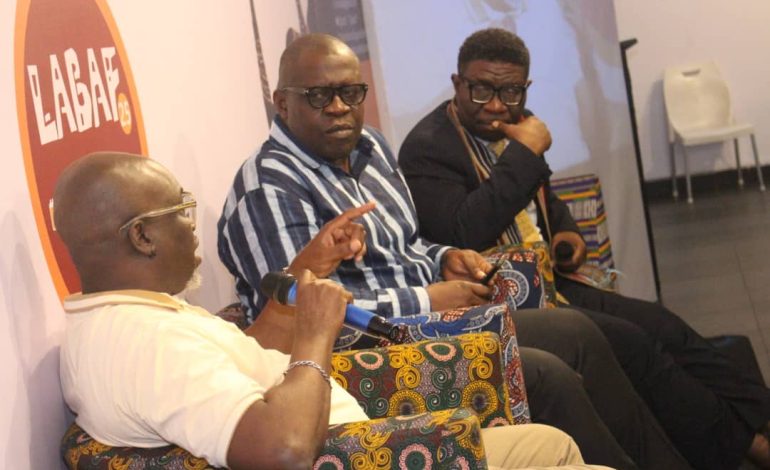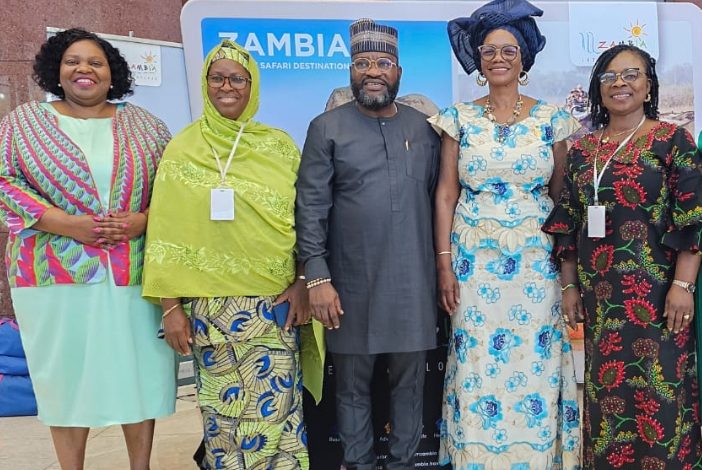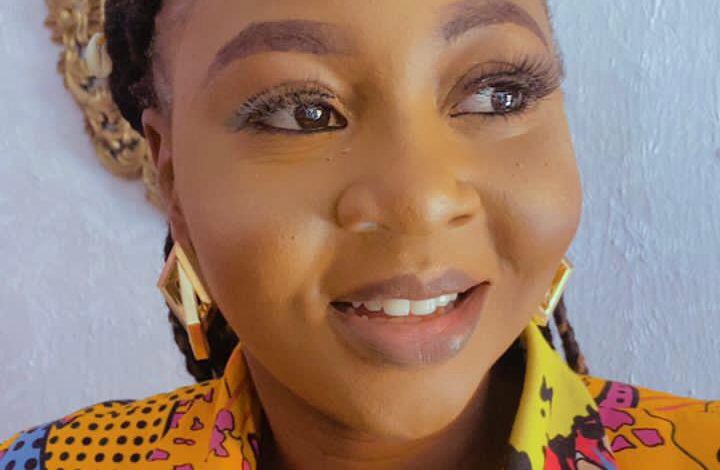We have not given sufficient credit to scriptwriters in Nollywood, say experts

* Odugbemi @60: LABAF 2023 celebrates a trailblazing advocate of good storytelling
* ‘Sometimes, producers add scenes to films without director’s knowledge’
* ‘If a film fails commercially, blame the producer’
By Godwin Okondo
IN a heartfelt tribute, Committee for Relevant Art (CORA) celebrated ace storyteller and content producer, Femi Odugbemi at the Lagos Book and Arts Festival (LABAF 2023) that ended recently at Freedom Park, Lagos. Odugbemi turned 60 last May. The honour was for Odugbemi’s significant influence in storytelling and literacy using the cinema as medium. His extensive body of work has consistently advocated for the powerful intersection of cinema and literacy, promoting authentic African storytelling that is deeply embedded in cultural contexts. As part of the celebration, some of his telling documentaries such as Bariga Boy, Ibadan, were screened during the evening session at the FoodCourt of Freedom Park to an appreciative audience of festival goers and revellers.
As part of the commemoration, a thought-provoking panel session on Nollywood ‘The Storyteller as Evangelist of Cultural Recentering: A celebration of Femi Odugbemi @60’ addressed the challenges of scripting, a matter often considered the existential problem confronting Nigeria’s film industry. The session provided a comprehensive exploration of scripting intricacies from various perspectives. Distinguished panel members included the President of Scriptwriters Association of Nigeria, Mr. Yinka Ogun, and President of Director’s Guild of Nigeria, Dr. Victor Okhai. The session was moderated by Dr. Shaibu Husseini.
Okhai expressed heartfelt appreciation for the roles Odugbemi plays in remaining true to his calling and not abandoning ship in the face of Nigeria’s failing economy, noting, “Many have left this country and become professors in top US universities, but he chose to stay. He could have excelled anywhere in the world. I apologize that we haven’t celebrated you enough, but we appreciate your decision to stay. He has impacted lives, including mine. Working under his leadership, I’m grateful for our paths crossing.”
Okhai also emphasized the crucial role of scripting in the Nigerian film industry, when he informed his audience, “If you have a bad script, no amount of magic can make a great movie out of it. However, with a very good script, even with average execution, that movie would go places, and that’s a fact. The script is the foundation; the vision conceived and put down on paper is what you ultimately see on the screen.

President, Scriptwriter Association of Nigeria, Yinka Ogun (left) stressing a point at LABAF 2023 panel session on ‘The Storyteller as Evangelist of Cultural Recentering: A celebration of Femi Odugbemi @60’, while moderator, Dr. Shaibu Husseini and President, Directors Guild of Nigeria (DGN), Dr. Victor Okhai looks on PHOTO: OLUSEGUN OLALEYE (CORA/LasGidiFest)
“We have not given sufficient credit to scriptwriters in Nigeria. I listened to Yinka, and I know he spoke from the position of pain in his heart, where we are not appreciated as we should be. Some celebrities don’t even remember the foundation, the architects, and directors who brought them to the screen. We are on Netflix today, and the world is celebrating our stories, because we are telling better stories. We are showing something that the world wants to see and hear.”
Okhai said the magic inherent in African stories is what keeps the world looking to Africa as the new frontier of storytelling, and advised his colleagues to dig deep into their roots to tell better stories, so interest on African stories could be sustained.
“If we were to look at Chinua Achebe’s Things Fall Apart, it has been translated into so many languages,” Okhai said, “and I doubt there’s anyone today who hasn’t encountered that piece of literature. What makes it unique is the fact that Achebe was able to tell our own stories. What you have is what makes you unique, not telling another person’s story. Our rich culture and heritage intrigue other people, because they see a whole new world that’s completely different from theirs, like they’re looking at a fantasy, and this is why, when you see children’s books, it takes you to a world that you don’t understand, and you get intrigued by it. That’s how the world sees literature and stories that emerge from this part of the world today.
“Take Amos Tutuola, for instance. As bad as the language of the book is, The Palm-Wine Drinkard isn’t about the package; it’s about the world he was taking us into, which is completely mystical and different. That’s what happens when we tell our stories. Our scriptwriters, especially the current ones, have been able to do that through the kind of stories we are telling, like King of Boys and The Wedding Party. The Wedding Party easily transports people from the West and the Global North into a world that they don’t understand. You see the colours and the tapestry against which that story is told, the rich tradition and all of that. It is intriguing, and that is what makes it fascinating for people to watch. This could not have happened without our storytellers.
“We are taking our ‘Tales by Moonlight’ and translating them onto our silver screens and palmtops, transforming them into media that is streamed on the internet. In doing so, people are now perceiving us in a light they never did before. Much like Afrobeats, our narratives, sounds, and images are finding resonance. This is evident in the substantial acceptance of content from this part of the world on various streaming platforms today.”
Ogun reflected on whether Nigerian scriptwriters are crafting narratives that genuinely capture the essence of the Nigerian environment and presenting them in the manner they should: “Scriptwriting in Nigeria is a journey in progress. The key drivers for effective research are either sufficient funding or the writer’s ambition for global recognition. Unfortunately, funding is often insufficient. Nonetheless, committed writers go the extra mile for research. While some producers acknowledge this need, the primary responsibility lies with the writer.”
Ogun then shared his own experience on how research deepens the writing process: “When I was writing Abeni for Tunde Kelani, I went to Cotonou to truly understand the atmosphere. I could simply have stayed in my hotel room and watch TV, but my adventurous nature led me to explore and interact with the locals. I discovered that, although we source frozen chicken from Cotonou, the locals don’t consume it. These nuances surface when you immerse yourself in research. Research is not always confined to hours behind your laptop; sometimes, it’s about experiencing the reality firsthand.
“Unfortunately, from what I see among young writers, many of them lack that desire. When I was writing, I aimed to go above and beyond to impress people. However, as I read scripts these days, I don’t observe that same effort. There’s a need for orientation. It’s about telling African stories in a globally relatable way. If you narrate your stories in this manner and conduct thorough research, you can’t go wrong. You’ll be amazed when you take the extra step to explore, as you might discover elements that enhance the appreciation of your story.”
Then Husseini ask the all-important question: if a film fails, who should be held responsible – the director, the producer or the scriptwriter? For Okhai, “There’s such a thing as ‘Director’s Cut’, meaning that the studio might release something different from what the director produced. Some directors complete jobs and they’re waiting to be invited to the studio, and then they’re told the job had been finished.
“I had envisioned all I wanted to do to make the film a good one and you tell me the job is done without me seeing it first? Sometimes, they add scenes to the film without your knowledge. Some tell you they have their own editors, so you shoot the film but the editors determine the final look and feel. Sometimes, you have to be a very powerful director to be able to negotiate from the beginning that no one can touch your work, but you don’t always have that privilege. The studio would just tell you you’ve done your bit and they have a concept of what they want, and they just pay you. Some persons, particularly women, aren’t in our industry at all but they want their faces on the screen, so they can be marketable in whatever thing they’re doing. Once they pay, producer put them in the film, whether their scenes make sense or not.”
Okhai explained the relationship that should exist between the script writer and the director of a film to be that of mutual respect, saying, “The director is also a writer, but a visual storyteller, and he takes the script and translates it to the screen. The writer could say that’s not what he wrote, and that’s his alibi for whatever comes up on the screen, but the writer needs to understand that, as soon as he finishes writing and hands over the script, your job ends there. From that point on, the director becomes the interpreter, but there must be mutual respect.
“There are things that may be too sensitive, and the director would need to rework that script to suit the environment or what may be trending or what may work, and it’s always good to do that with your writer, so that everything is done in context, in a sense that the adjustments made tie in at the end of the day. That’s the kind of relationship we should be having, so that at the end of the day, the director or scriptwriter does not deny his work. There are different elements to the screen, like production design, lighting, actors, sounds, which the director employs to tell his story. If the film fails commercially, blame the producer.”
So, what can be done to address storytelling challenges in Nollywood? Ogun advised getting good education or mentorship in storytelling to be properly equipped for the job. Gate-crashing into writing as it happened some years ago, he said, is what has been the bane of storytelling in Nollywood, as many who write scripts do not know what it takes to write.
“Today, everyone just gets into writing, but at some point you need to get some form of education about it,” he said. “You don’t have to go to a formal school and spend five or six years; there are lots of opportunities out there, but you need to learn how to write and tell stories. I’ve been lucky in my career because I’ve learned through people who knew what they wanted. It is important to have some kind of education or mentorship. For the first nine months of this year, I was head of scriptwriting department at Ebony Life Creative Academy. And in those months, I became a better writer, because to teach you must learn, and in learning, I discovered so much. Sometimes, people stumble on a story and they seem to get it right the first time, but if you understand how these things work and you do it consistently, you either learn it in a formal or informal school or mentorship.
“If we have that, instinctively we start to tell better stories that aren’t flat, and also see the need to develop the characters. Adequate capacity building will do a lot and instil a sense of professionalism. We can create all the capacity building opportunities for all the members of the guild, the members are about 25 per cent of practicing writers in Nigeria. As you go higher in the film industry, it becomes more professional, but you might not get that level of professionalism at a lower level, because there’s undue interference. Sometimes, the audience at that level is not so discerning or demanding. Some footballers might come from outside the country and say they want to shoot a film without knowing what it takes; they just want to play the lead role and there must be two kissing scenes with an actress, and they don’t care if the film is released or not. I don’t think these kinds of things will happen on AfricaMagic or Netflix.”



